Phonics, Reading and writing
The Wells Free School Vision for Reading
Reading is the gateway that makes all other learning possible. The Wells Free School believe that when you give children the gift of reading, you give them the gift to explore the world at their own pace. We strive to promote a love of language and literature to enhance and enrich our children’s lives. We believe that every child should be given the tools to develop into an enthusiastic and confident reader both at home and at school. Our children are taught how to decode, retrieve, and interpret what they have read. Decoding through systematic phonics is at the forefront of our teaching of early reading to enable children to be able to interpret and comprehend what they have read. Reading improves language and vocabulary, inspires imagination, and gives everyone the opportunity to develop and foster new interests. Reading fluently has three main components, accuracy, automaticity, and prosody (which includes pace, expression, a knowledge of when to pause, change pace and volume). By reading with accuracy and automaticity it frees children’s cognitive capacity to work on comprehending the text, which in turn is shown through their prosodic reading. We understand that fluency is not about how fast a child can read, but rather reading in a way that bolsters understanding. At The Wells Free School, we strive to model reading and reading behaviours to our children and believe in the importance of reading to our children on a daily basis and employ ‘echo reading’ to support these key reading skills. Regular and consistent modelling of reading aloud and the associated skills to our children will support them to develop healthy reading behaviours and reading resilience.
Our youngest children start their English journey with Supersonic Phonic Friends, which is a government validated phonics programme. They learn the phonic sounds and skills associated with both reading and writing with the help of our Supersonic Phonic Friends characters in fun, active and engaging discreet phonics sessions. For those children who continue to need phonics support in KS2, we continue to work with the scheme to provide daily interventions. Staff have been fully trained by Anna Lucas, the creator of Supersonic Phonic Friends, and the school is a ‘hub school’ for the Southeast of England. Below is our phonics policy and the progression of phonics from EYFS through KS1.
The Wells Free School Vision for Phonics
At The Wells Free School we believe that reading is the gateway that makes all other learning possible. We believe that when you give children the gift of reading, you give them the gift to explore the world at their own pace. We strive to promote a love of language and literature and enrich our children’s lives, opening doors to endless future possibilities. Every child should have the chance to become happy, fluent readers and develop a love of writing. Our youngest children start their journey with our SSP Supersonic Phonic Friends. Phonics is taught though a highly structured programme of daily lessons across FS/KS1 using a variety of fun, hands on and engaging activities. This takes the form of a whole class ‘keep up not catch-up’ approach. Each session gives an opportunity for children to revisit their previous experience, be taught new skills, practice together and apply what they have learned. The teachers plan lessons using a synthetic approach to teaching ‘pure sounds’ and the skills of segmenting and blending with the help of our Supersonic Phonic Friends. Children in KS2, who are identified as needing extra support, will benefit from daily phonic interventions following the Supersonic Phonic Friends scheme from highly trained staff.
Appendix A - Supersonic Phonic Friends Progression
Supersonic Phonic Friends Phase 2 Sounds
//player.vimeo.com/video/861164715?title=0&byline=0&loop=1#t=0.5
Supersonic Phonic Friends Phase 3 Sounds
//player.vimeo.com/video/861160215?title=0&byline=0&loop=1#t=0.5
Supersonic Phonic Friends Phase 5 Sounds
Coming Soon
Reading Progression
When they are ready, children progress to Accelerated Reader. Children have regular ‘Star Reader’ online assessments, which analyses their responses to questions about a text and provides a book level range personal for them. Children choose a book at their appropriate level, before completing a quiz to assess their comprehension of that text. Accelerated Reader gives children autonomy over their reading and promotes enjoyment, allowing a choice of appropriate books rather than those given to them. Teachers and leaders regularly monitor the children’s Accelerated Reader assessments and use these to set the children’s next steps and support them in their reading journey.The school are incredibly lucky to have wonderful reading volunteers, our ‘Reading Angels’, who come in weekly to listen to our children read. The children thoroughly enjoy the time they spend together and are often eager to spend more time sharing their reading. We have a thriving reading club who get together weekly in the library, to read, share reviews and support each other to try new books from recommendations. Some of the children in our School Council even have their book recommendations on display in the children’s library at The Amelia.
As part of our drive to develop an enjoyment of reading, we have recently undertaken a competition to create reading areas within our classrooms. The children were fully immersed in the design and creation process, having to carefully budget with the £100 given from the PFA. These areas were then judged by the Education Officer at The Amelia and two classes were awarded the prize of new books for their classrooms.
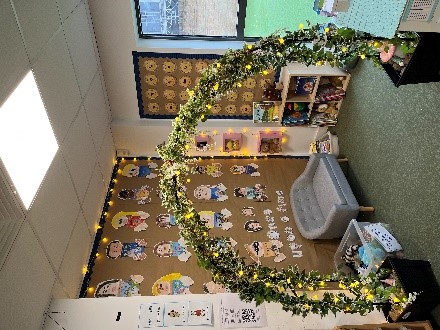
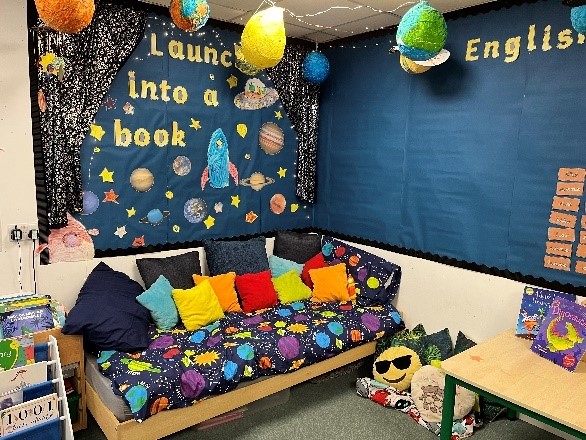
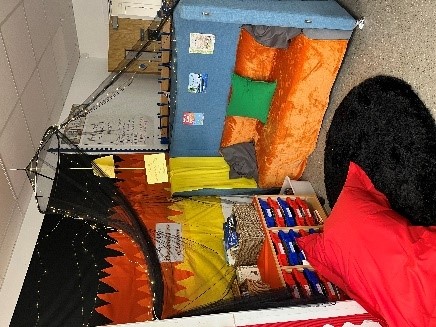
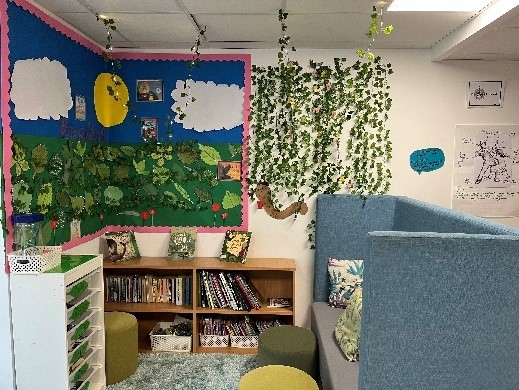
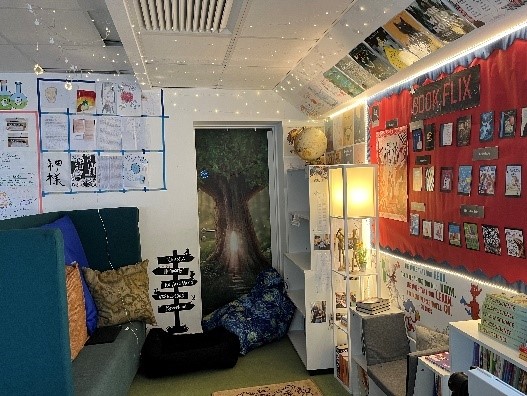

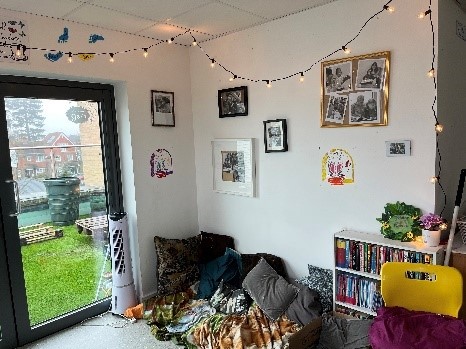
We have just redesigned our school library, with the help of our wonderful PFA and our neighbours, Cripps solicitors. The children are really excited to see the designs bringing the space to life.

Reading for pleasure at home is just as important as at school. If you are unsure of some high-quality books which would be a great read for your child, please follow the link below to the Centre for Literacy in Primary Education to look at their core book suggestions.
https://clpe.org.uk/books/corebooks
Our English lessons are inspired through a love of high-quality texts, film, and drama. In the early years and at the beginning of Year 1 we use ‘drawing club’ to open up the magic world of tales and stories whilst at the same time enriching their language, developing their vocabulary and writing skills, developing their fine motor skills and sharing time with them. Drawing club immerses children into a world full of imagination where anything can happen. From term two of Year 1, our children move from Drawing Club into ‘The Curious Quests,’ to ensure progression in writing, whilst maintaining a play based, continuous provision approach to the English curriculum. Through The Curious Quests, children have the opportunity to learn SPAG and apply their phonic understanding in a playful, fun and engaging way. From Year 2 onwards our children continue their love for reading and writing through the ‘Power of Reading’ from the CLPE (Centre for Literacy in Primary Education). We believe that sharing a book as a class is a powerful learning tool and one which allows immersion and a depth to discussion. This gives access to opportunities for talk, group work and active learning opportunities, as part of their English curriculum, as well as time to reflect upon and edit their work. Following on from pupil voice, we have also introduced a ‘free write’ week per term to give children the opportunity to plan, write and edit an independent piece of work based around their own interests. These will be based on a genre that the children have written before and may be inspired by short films, pictures or their own likes or passions. Below are the Reading and Writing Scales from the CLPE which support our planning and progression across the school.

